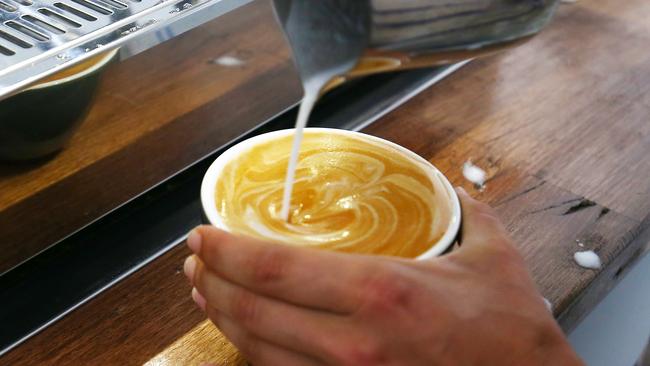Coronavirus lockdowns hit latte lover coffee demand: Rabobank
The barista industry was one of the first victims of the COVID-19 lockdowns as coffee shops shuttered their windows.

Coronavirus has hit global coffee production, with agribusiness lender Rabobank forecasting demand to fall by up to 60,000 tonnes – the equivalent of 1 million 60 kilogram bags – as widespread lockdowns force latte lovers to miss their caffeine fix.
But the drop in demand doesn’t mean the cost of a flat white or a long black will get any cheaper as social restrictions loosen, the bank warns.
In its latest quarterly 2020 Coffee Outlook, Rabobank estimates global coffee demand to shrink 0.8 per cent to 164.1 million 60kg bags this year.
The barista industry was one of the first victims of the COVID-19 lockdowns as coffee shops across CBDs shuttered their windows following an exodus of their usually lucrative office worker customers.
Rabobank Australia commodity analyst Charles Clack said while the pressure on global coffee prices might herald good news for cafes and food service outlets trying to get back on their feet post coronavirus, it might not mean lower prices for consumers.
“Less out-of-home purchasing has seen downward pressure on a number of soft commodities around the world, which could make the raw ingredient prices for Australia’s café and restaurant sector, including coffee and sugar, dip lower,” Mr Clack said.
“This may help these businesses as they come out of COVID-19 lockdown and over the coming year or so.
“That said, this won’t necessarily translate to cheaper prices for the consumer, as there is a lot more that contributes to the cost of the flat white you enjoy from your local café than the commodity prices alone, with labour, business overheads and other costs a significant part.”
Rabobank Agri Commodity Markets Research senior analyst Carlos Mera expected the US, which has reported 102,000 COVID-19 deaths, to be the hardest hit, with coffee demand expected to fall 2 per cent.
Sharper falls in US
Mr Mera said the decline in out-of-home coffee purchases and the country’s low level of unemployment benefits reducing consumer spending meant sharper falls in the US as consumers tighten their belts.
“And higher supermarket coffee sales were unlikely to offset the drop in out-of-home consumption witnessed in April,” he said.
Meanwhile in Europe, Rabobank is expecting a 0.5 per cent fall – mostly concentrated in the tea loving UK – given there is a higher level of unemployment benefits across EU countries.
“The decline (will be) concentrated in the UK, where there is a tea culture at home as well as lower unemployment benefits, and in southern Europe, where there has been a lower volume of tourists.”
Mr Mera said global coffee production was well placed to respond to a bounce in demand expected post lockdown, but a peak in infection rates in Brazil – the world’s biggest coffee producer – could derail supply.
“In Brazil, the great 2020-21 arabica harvest is beginning in virtually all regions. Preparations have been made and, as far as we can tell, there is no labour shortage for the time being, though the peak of the harvest will be in June-July,” Mr Mera said.
“On the price front – assuming both no major production disruptions and weakened demand – (Rabobank) expects dollar commodity prices for coffee to fall in the short term, impacted by the weakness of the currencies in Brazil and also Colombia, another significant coffee producer.”








To join the conversation, please log in. Don't have an account? Register
Join the conversation, you are commenting as Logout